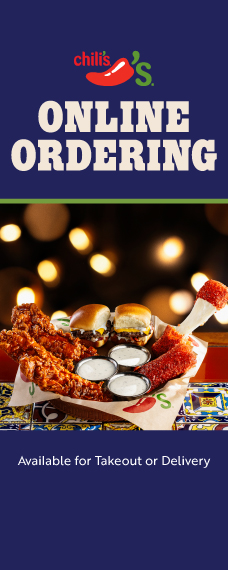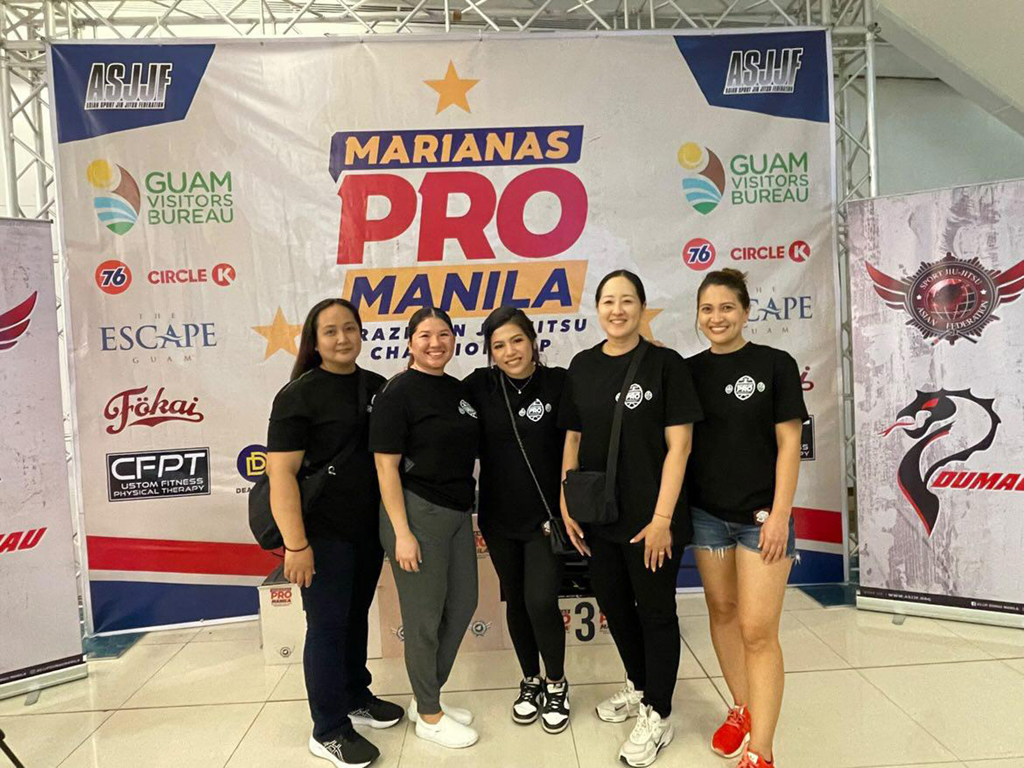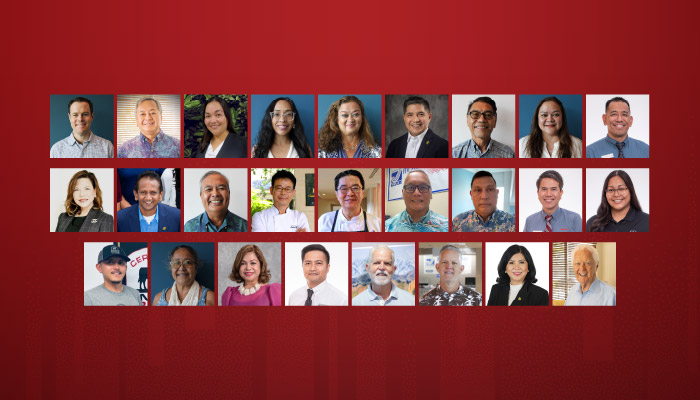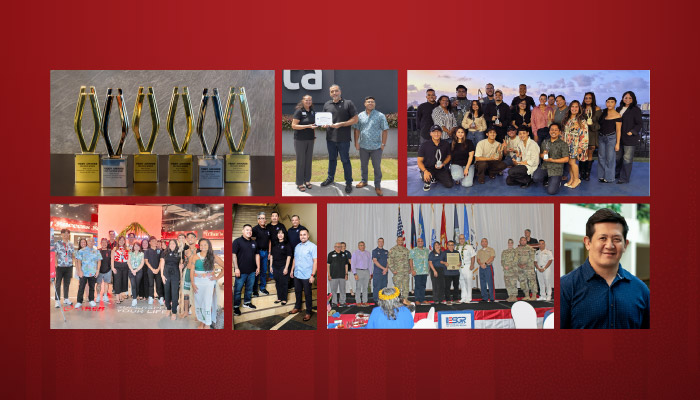What makes a young businessperson take the path that they’ve chosen? And how do their attitudes shape their career, their community involvement and their perspective on the future? We find out in conversations with some of the individuals who represent the younger sector of business communities of the islands.
By Maureen N. Maratita and Oyaol Ngirairikl
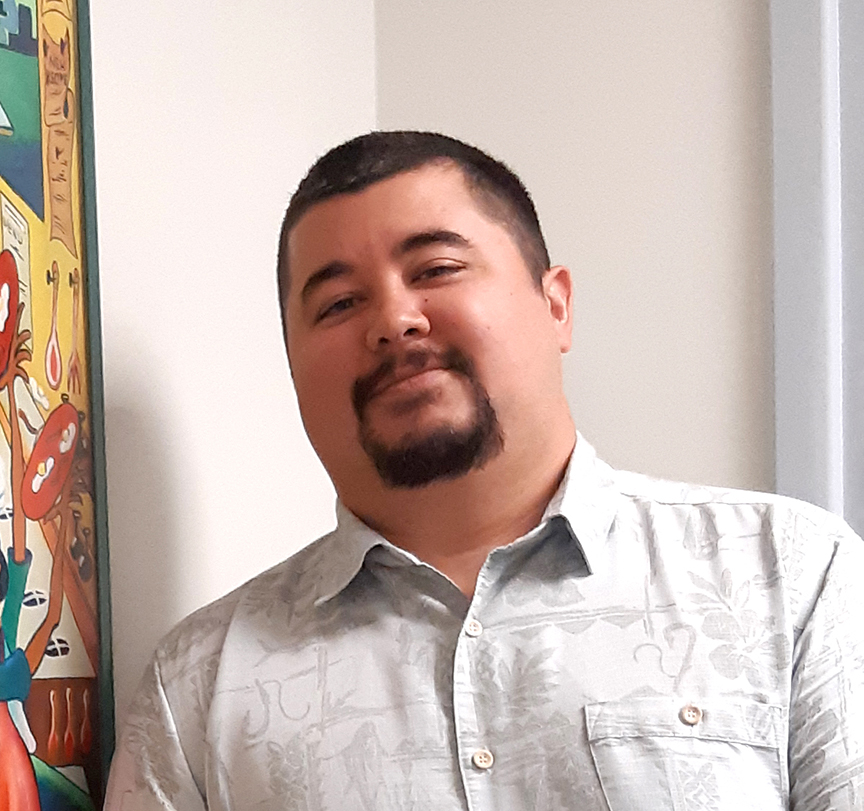
Nicholas D. Alcorn, 30, director of operations, GFS Group
On joining GFS: After culinary school [in 2013], it was just the timing of redoing Kings [Restaurants]. It just so happened I learned how to cook in Kings, and I thought it would be a great contribution to come back and help out with Kings. And it all worked out. I went back to California for a bit [and worked with DaVinci Financial] and then came back in 2017.
On joining the family business: There was no pressure. We all have different tasks, but we do see a lot of each other — most of the time in the office — but I’ll be involved with the DoDEA schools or contracts we have with the military, or I’ll be with my brother [Derek Alcorn, vice president of restaurant operations] in the restaurants.
On working with other generations, and older colleagues: I learn a lot from them; I don’t have an issue on working with them. There’s no real minus to that.
On his generation: I think we’re very open-minded. Something I’ve noticed with my generation is a lot of us want to be successful. We see a lot of entrepreneurs doing their own thing — we want to do that — be your own boss, travel the world, do different things. I think my generation is open-minded to more knowledge — hearing people talk about their history, their life lessons, business, whatever it is.
Golf’s become a big thing with my group now. Everyone’s trying to get into golf, so we can hang out. I have been doing some lunch meetings with friends to talk about business ideas – entrepreneurial things. It’s always good to get a fresh opinion and see whether it will work or not.
On work-life balance: Being a new father, I definitely wanted to spend more time with my child. I have a one-year-old; I don’t want to miss out on any moments. I did used to worry [about having a child] but I love having her. It’s the best thing ever.
I slow down, but I don’t ever really switch off. My creative side kicks in and I want to do something with Kings or Ruby Tuesdays. Also, I’m accessible pretty much 24-7 for GFS. They call if there’s any kind of emergency. I do enjoy problem solving. It can be rewarding, definitely.
Big picture issues: I believe global warming is one of the most critical issues we face as a planet. It will significantly impact our future. We need to take more significant steps to address it and mitigate the damage that has been done. Sustainability is essential for our island and future. We must be mindful of how we use our resources to impact the environment. We must find ways to protect our island. [For example, GFS uses biodegradable products] There’s a big interest there [in GFS]. I admire local companies that practice sustainability and hope to see more participation from other companies and individuals. think it's crucial for companies to be involved in recycling and environmental initiatives and to try to buy local as much as possible. I also think it's essential for businesses to be aware of the "green" movement and what they can do to reduce their environmental impact.
We must maintain our culture. It is a representation of who we are. We must keep our traditions alive by passing them down to the next generation, speaking our language, and cooking our traditional foods. If we lose our culture, we lose our identity.
Gender equality is a basic human right. Everyone should be treated equally, regardless.
Government transparency and accountability is very important because our democracy depends on an informed electorate. Without transparency and accountability, we can never be sure that our elected officials act in our best interests.
On role models: I am influenced by individuals who are positive and creative. I follow entrepreneurs like Elon Musk and Rob Dyrdek, who are both very creative and highly optimistic. I also listen to mentors like Tai Lopez and Gary Vee, who have much wisdom to share.
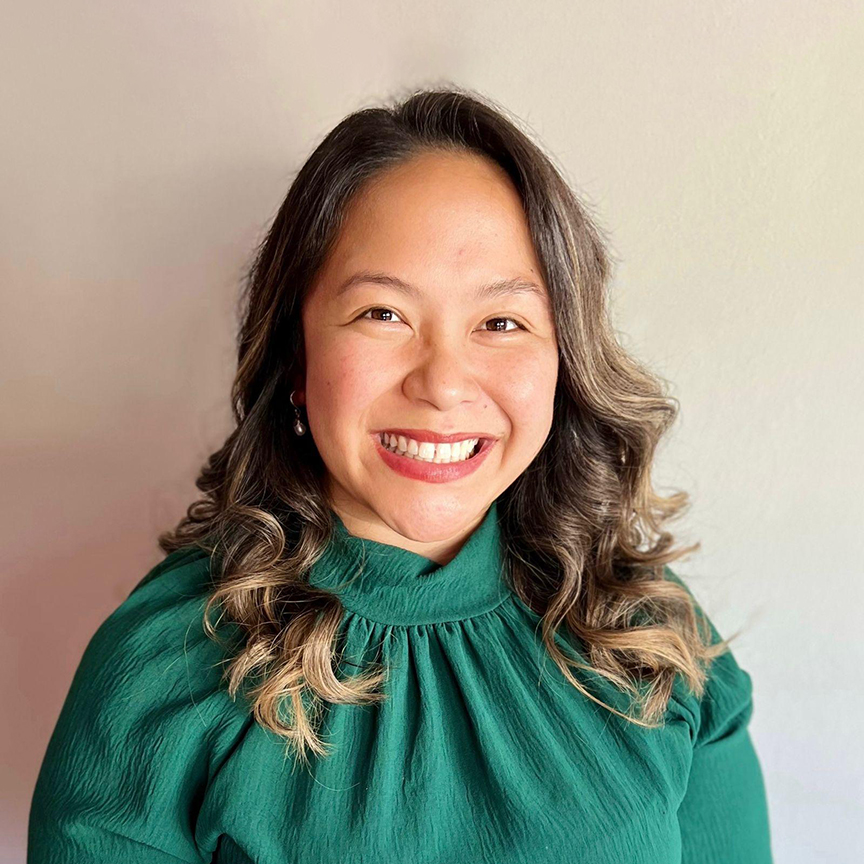
Nichole S. Babauta, 34, consumer sales manager, Docomo Pacific Inc. CNMI
On career choices: My father, Vicente “Ben” Babauta [CEO for the 2022 Northern Marianas Islands Pacific Mini Games and former assistant general manager of operations for DFS Saipan] has always been an inspiration to me. His love for the CNMI and his involvement in the business community naturally lured me to world of trade and commerce. As such, I’ve been blessed to serve in various capacities within the commonwealth.
[Nichole Babauta holds a master’s of business administration from the University of Phoenix, a bachelor’s of science with a concentration in global business management from the University of Phoenix, and an associate’s of art from Northern Marianas College. She is a member of the board of directors of the Saipan Chamber of Commerce and the Northern Mariana Islands chapter of the Society for Human Resources.]
One of my greatest fears is to become complacent. In serving the CNMI as the director for the CNMI Small Business Development Center, I had reached the height of my career in the role and felt the need to sharpen my skills and abilities. The role offered by Docomo Pacific provides me the opportunity to make help make a direct impact on the community’s accessibility to a necessity within an industry now considered a utility.
On the pluses of working with other generations: Working alongside those of an older generation pushes me to be open-minded to ideas and solutions that are experience-driven. It is my best practice to take time to understand preestablished pathways in life and noting how to further continue the expansion of opportunities for generations to come.
In addition, I believe that there is a lot to be discovered when working alongside the younger generation. With their drive and flexibility to adapt to a new environment, I’ve recognized the value in identifying new solutions from their fresh ideas and outside the box perspective.
On the minuses: We must find the median in working together where we respect ideas that have laid the foundation, and welcome ideas that will continue our efforts. As one that comes from the in-between generation, it is our duty to find a way to weave together all generations that pays homage to history yet also plants seeds for the future.
On what Babauta’s generation does better: Adapt to the fast pace technological advancements that have been ongoing throughout my generation. Like other millennials, we were pushed to continue to adapt with the various changes that affect, but also more efficiently support, how we function in our daily lives. This adaptability has been engrained in us and I believe comes naturally to my generation. As millennials, we never needed to catch up to the changes — it has always been a continuous adaption.
What to learn from older generations: Tenacity in their work ethic at a time where there were foundations to be built from the ground up. It’s almost impossible to imagine how those before us were able to build and create with limited convenient resources and technology – yet they did. If we take that same work ethic of seeing possibilities where there is nothing and the convenience of resources around us today, we will continue to build a generation that will continue to progress efficiently forward.
What older generations can learn: How to adapt to a technologically advanced generation. As a millennial, I’ve witnessed the shift in the digital age. I understand the way the world works today, but also, I can reminisce on how things were in the past. For example, I remember the days where we used to watch TV from a cable box. Now, I enjoy watching digital TV conveniently on multiple devices.
On work-life balance: I believe that in today’s age that we are more heavily influenced by what those around us are doing because of the accessibility that social media provides. We see those who are hustlers, shattering the glass ceilings. We also see those who prioritize mental health. Once again, I believe I am living in a generation that is trying to find the median between the two. I don’t believe my generation values one over the other more, but rather, we are working towards finding the middle ground to be able to live happy, successful, impactful and financially stable lives.
My mentor: Tracy Guerrero, director of operations for Atkins Kroll, Guam. She radiates confidence whenever she walks into a room with a fierceness that commands respect. She is fair and honest when delivering her opinions and suggestions. As my Executive Leadership Development Program mentor, she has taught me to not be afraid to take risks when finding solutions and to remain steadfast in my values.
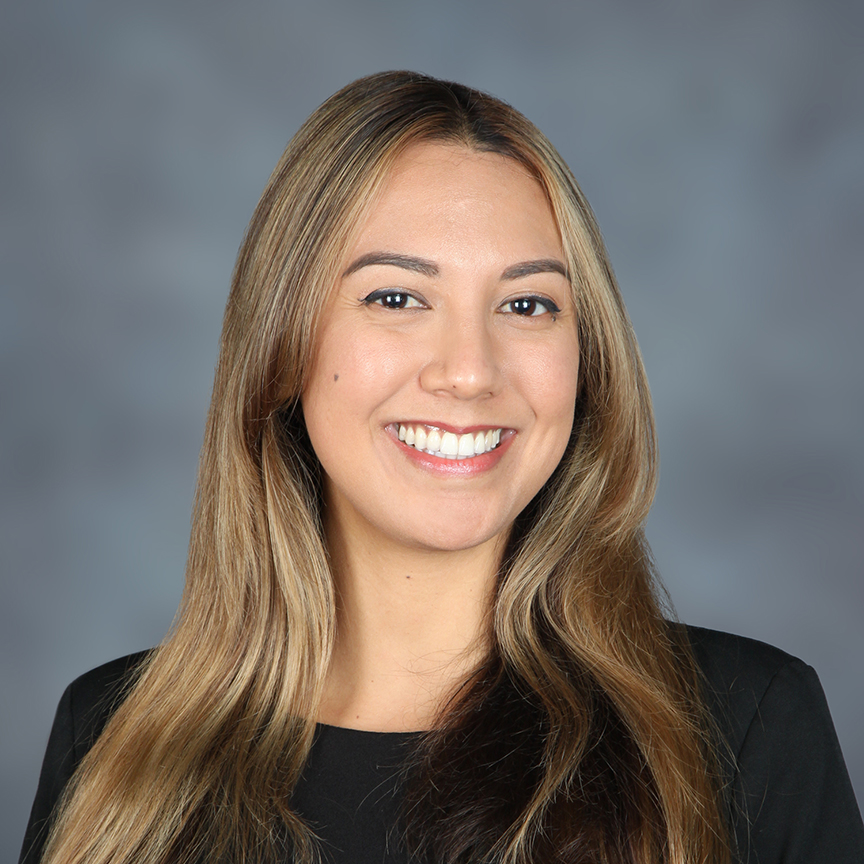
Isa B. Baza, 31, attorney, Blair Sterling Johnson & Martinez
At the firm, I primarily do banking and commercial work. However, I’m also involved in civil litigation and most recently, some court-appointed work with juveniles.
Education and career changes: Before becoming an attorney, I was a reporter at KUAM News for several years, where I also anchored the weekend newscast and hosted a show called Health, Home & Lifestyle. Being a reporter was a lot of fun because it opened the door to some really cool experiences …
I have a B.A. in English/International Studies from the University of Miami, and a J.D. from the Mitchell Hamline School of Law.
When I was younger, I would watch CNN and imagine what it was like reporting on issues around the world. English was my strong suit and I loved talking to people, so journalism seemed like a good fit. I applied to be a news reporter on a whim and felt very fortunate to eventually get the opportunity to work at KUAM [for several years].
I always thought about law school in the back of my mind, and felt like if I didn’t do it, it would be something that I would regret. Although I have quite a few attorneys in my family, I think what inspired me was seeing strong and powerful female figures in the courtroom when I was a kid, such as former Judge and Attorney General Elizabeth-Barrett Anderson.
When I got older, I also realized the need for attorneys in Guam, and that there are a wide variety of practice areas that you can pursue. I’ve always been interested in business and even started my MBA once, so it was natural for me to gravitate towards business/corporate law. However, law school is very expensive and so getting started was the hardest part. I was fortunate to receive a scholarship that helped offset my tuition, and I also worked full-time throughout college to help with the expenses.
Working with different generations and mentorship: I think you always have an opportunity to learn from those you work with, and especially when those you work with are older and more experienced.
[As a spokesperson for the Guam Department of Education] I was fortunate that I had the opportunity to work alongside people like Superintendent Jon Fernandez, our deputy superintendents, Judge Arthur Barcinas, and now the partners at my law firm.
The Superintendent was a great mentor, and I learned a lot by working closely with him and our management team. After law school, I also worked at the Superior Court under Judge Arthur Barcinas. Under his mentorship, I was exposed to the entire gamut of civil and criminal law and had the chance to sit through several criminal trials. I think it’s important to seek out and work with people who are the best in their fields, because working under someone who operates at a higher caliber than you forces you to step up your game.
The younger generation can be equally inspiring, and you don’t have to be a certain age to be good at what you’re doing.
What Baza’s generation does better: In general, I think it’s become second nature for my peers to gravitate towards technology, and so it can be easier to incorporate and embrace it. For example, I feel like my peers and I are pretty open to doing more things digitally, to include banking, online schooling and teleworking. I actually went to law school partially online, which was a very new concept for the lawyers in my family and the legal field in general.
Work-life balance: Personally, I definitely value my career and actually really enjoy working, so if I have to pull a little overtime to get something done, I don’t mind. I just wouldn’t want that to be an everyday thing. Spending time outside of work with friends and family is a priority for me, and I think that just like with fitness, rest and recovery is key to peak performance in the workplace.
Role models and inspiration: At the moment I’m really interested in self-development, investing and entrepreneurship, so I’m inspired by and follow a lot of people in those arenas. For example, I’ve read books by Vanguard founder Jack Bogle and over the past couple years have gotten more into intra-day trading. I’m also inspired by a lot of entrepreneurs and innovators, and love the stories about people like Steve Jobs, J.K. Rowling, Sara Blakely and Elon Musk. In the personal development realm, I keep up with Dr. Benjamin Hardy, who is an organizational psychologist and author focused on self-development and a little business. I’ve read all of his books with entrepreneurial coach Dan Sullivan. I’m currently reading The Art of Learning by chess and Tai Chi Chuan champion Josh Waitzkin, which is also about mindset and peak performance.
Big picture issues: I think these are all really important, and it’s good to be aware of these issues and the impact you can have through your day-to-day decisions. For example, avoiding plastic water bottles and bags, and buying local when you can, will make a big difference over time. I think changing behaviors all starts with awareness and open-mindedness.
Community service: I’ve been on the board for Sanctuary Inc. since last year. … I love Sanctuary’s mission to support troubled youth and have seen the positive impact it can have on youth and families, so I am very honored to be a part of the board.
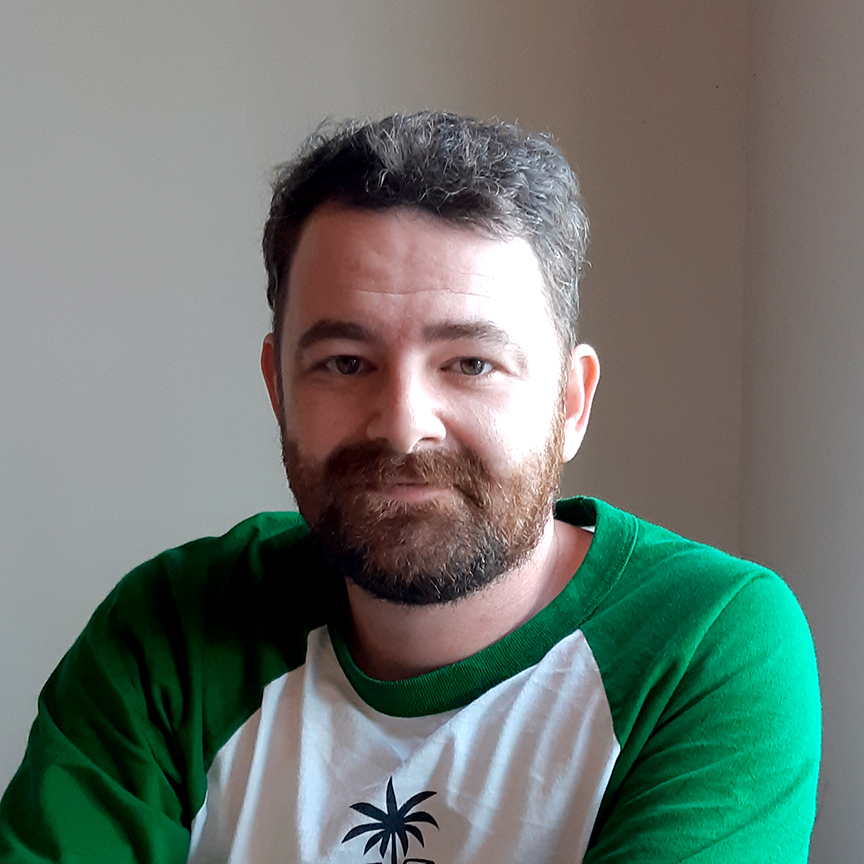
Andrew Brunson, 29, head brewer, the Guam Brewery, Blue Lagoon Plaza
On brewing and work: I was a homebrewer before I started doing it professionally - I thought it was interesting, and a fun hobby. While I was taking classes at University of Kentucky, I managed to get a part-time gig helping on the canning line of a craft brewery in Lexington, in exchange for free beer. That was a great for a student, and it just spiraled outwards from there. What made me choose this field is that it is a combination of my two favorite things: science and screwing around.
I’ve been brewing professionally for 12 years now. I always took the gigs that interested me the most. Before Guam I’ve brewed in Vietnam, Australia, Jordan, Hawaii, and a bit of beer and bourbon in Kentucky.
Working with different generations: In a brewery I mostly care that someone can safely lift a 55-pound sack of malted barley, and on the customer service side of things, being a gregarious human being is more important than the year someone was born.
What his generation does better: Set up a wifi router, connect a cable box to the HDMI port on the back of the TV change the text size on an iPhone — I know that’s a fairly glib response, but if I had to play to a trope that would be it.
Learning from older generations: I was never really taught about investing or the finer points of being prepared for the future in school, which is a real shame, but I’ve been trying to get better about that over the last few years, and the old folks in my life have been a big help.
What older generations can learn from Andrew: How to setup a wifi router, connect a cable box to the HDMI port on the back of the TV, change the text size on an iPhone. I take that back. Just hand me the phone I’ll do it. It’ll be way faster.
Work-life balance: I would say that my generation values work life balance BECAUSE of a lack of progression and salary. A fella working at a shoe store or something in the 1960s could own a home and support children on that one income. All of that is impossible for most of us today, so it makes sense that we — generally speaking — would want to keep a tight grip on the one thing that’s still ours — a personal life. It also happens to be the one thing you can’t buy more of.
Beginning to be the older generation: I have found it nice to be in my 30s because I get taken a bit more seriously than I did in my 20s. It’s hard to say if that’s because of my age, or that I’ve grown as a person.
Big picture issues: Climate change will affect our futures more than just about anything. The world is going to get really dicey in the next few decades. It’s one of the reasons I feel like folks in my generation should try and see as much as we can. That coral reef or that glacier won't be around in 50 years.
Community service: Environmental and conservation-related causes have always been close to my heart. The thing about the environment is that once it's gone it’s real, real hard to get it back.
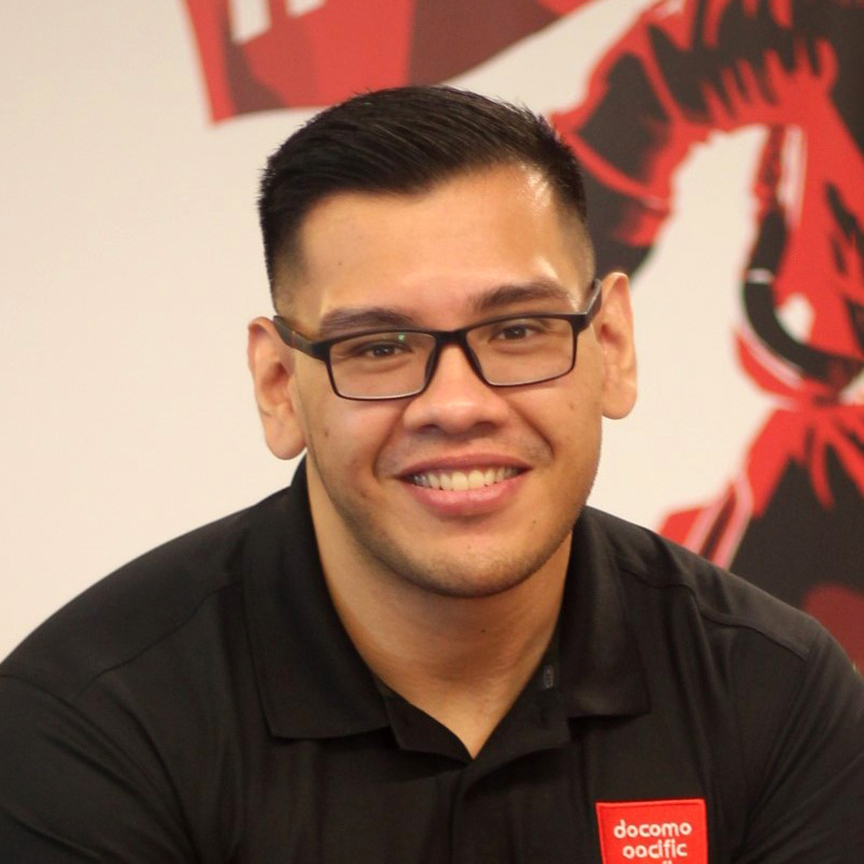
Tito F. Castro Jr., 29, director of enterprise sales and operations, Docomo Pacific Inc.
On his career (formally since 2015): It was a great happenstance; I interned at Docomo Pacific the final semester of my bachelor’s program, my bachelor’s of business studies at [the University of Guam.] It was quite a great adventure. I actually helped to start their direct marketing team during my time there.
On the attraction of the sales field: It started at one of my original college jobs at Macy’s [where Castro worked for four years while studying the University of Guam]. I’ve always enjoyed seeing a smile on a customer’s face — knowing that you’ve done something directly to make their day better. It may not have been the enterprise side of the house. These are much more sophisticated level discussions that we’re having for much larger solutions, but at the end of the day people are people and how you approach people — I learned my roots at that job specifically.
Moreso than getting anyone to sign a contract, it’s how you actually fulfill that trust and that promise, even if something goes wrong, what I’ve found is if you act with urgency, sincerity and a purpose to resolve their issues — that’s what people can see.
Sometime in the mid- to long-term future I would like to explore a little bit of what life is like working for a larger corporation in the States; ultimately my long-term goal is to come back and bring that extra knowledge back to the island. I’ve always been a home-grown boy … and I do travel a lot to get that itch out and to get a new perspective.
On other generations: I was raised in a multi-generational household. I was actually raised by a silent generation [member] and a baby boomer. My parents were on the older side of what an average typical parent of someone my age is. My dad was born in 1941. I’m probably one of the youngest people in my family in general; my cousins are pretty much Gen X [ages 42 to 57] and above.
It may be easier on me than some other people as far as working with — and ultimately having to manage a multigenerational team.
In general, as far as plusses go, there’s a lot of value in working with older generations as far as them really being a great gateway into knowledge … They’re already people that are established —whether you’re talking internally or externally — and they have a lot of information to share that no one should take for granted.
As long as my generation is willing to ask the questions and not remain in the status quo, then it’s figuring out why do we do things that way? We can come into the picture with — does that make sense even for us and do we want to try something. Not that we’re right, but does it work better?
One of the stark differences — and even I’m experiencing it, is how people choose to communicate … now I’m seeing teenagers entering the workforce. There is not one size fits all anymore. That world has changed. Some people are more comfortable texting, more comfortable on a message as opposed to a phone call. Some people lean more towards a phone call as opposed to writing things down. Some people want to meet face-to-face and now with this reality, some people much prefer virtual over in-person.
On work-life balance: Being raised the way I was, it’s probably ended me maybe weighing them at different strengths. I do value work-life balance, but I’ve been seeing a lot of social media trends as well, … really highlighting my generation’s need for work-life balance. I was raised that there really are no short-cuts, that you must appreciate and work hard for everything that you get. As much as I value work-life balance, succeeding in my professional career also matters just as much.
I don’t think it’s healthy to establish a full-on “I’m not going to work for you after five” mentality, but it depends on what your desires are. My desire is professional growth, and it will remain that. But that are times where there’s going to be something that weighs more in my personal life so that I’m going to have to set a boundary at that moment. As long as that’s a general healthy accommodation, I think that’s where we’re going and that works well for me.
Role models: I’m a very proud UOG alum. A lot of how I am and who I am today is also shaped very much by a lot of the professors that I’ve had. Specifically, Dr. Annette Santos, the recently-retired dean of SBPA and my marketing professor, Professor O’Brien. They’ve had a drastic effect on how I see the world and the environment and how we operate in it as people, and how organizations also operate in it from a value perspective and from a strategic perspective.
I do tend to follow the CEOs of other telecom businesses on LinkedIn. They’re very active and it’s very interesting. I like to stay up to date with how they are actually running their business. A lot of telecoms in the States they have CEOs that are responsible just for the enterprise side of the house.
Big picture issues: I’m generally mindful of all of them. I understand that the big decisions that happen … will have an impact not only on me, but what happens as I continue to grow up. I don’t keep myself up at night thinking about them, but they’re definitely issues that I’m not blind to. I do my direct part.
On his generation: [We’re] more about leaning into opportunities. We’re in a place where we could get something immediately. … [We’re] a little bit more candid because I think it’s that immediate gratification my generation’s known for … in terms of possessions and whatever your goals are, but making it happen.
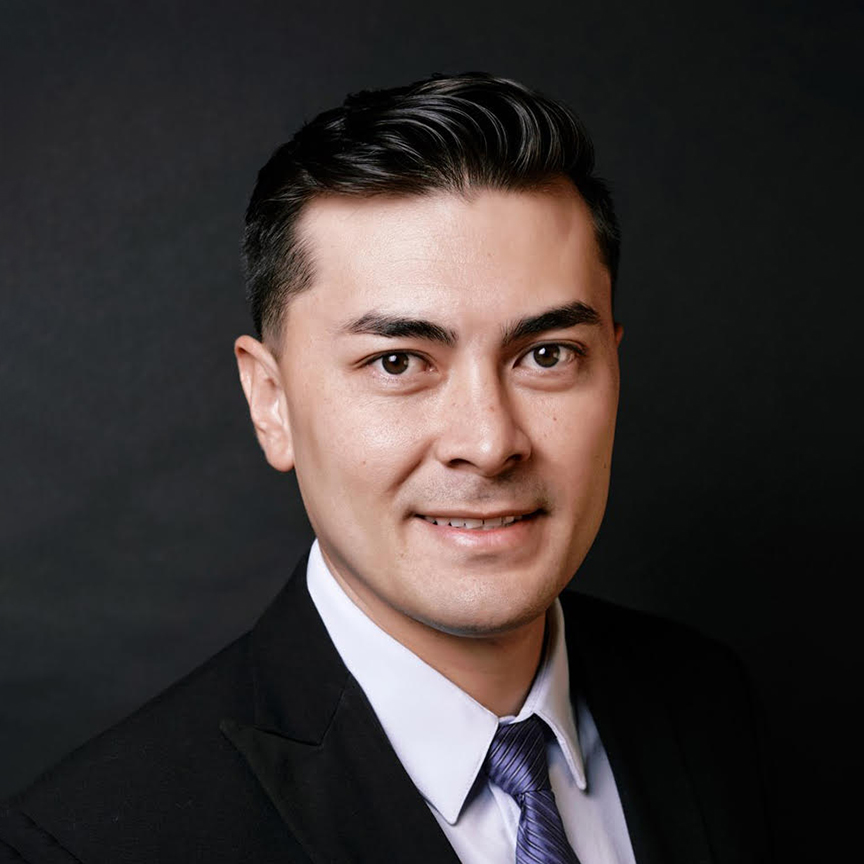
Stephen Gatewood, 31, sales and customer service manager for Matson Navigation Co. for Guam and Micronesia
On his career: After college, I had planned to go into the legal field. I took a gap year, and started with Alupang Beach Club and I really enjoyed it. The tourism industry at the time – we were hitting great numbers. Our record year in 2019 was 1.6 million visitors to Guam and … at ABC I got to do travel and do a lot of sales and marketing for the company. Getting into that job was a great high-paced, high-volume customers and I sincerely enjoyed it. … It was fun, but it was also very educational — how to pivot, how to adapt and how to have a customer service focus, trying to make the customer so happy that they wanted to come back again. I really took that from my experience there.
When I started looking into other industries, I did see the shipping industry as one that I really wanted to get into. Specific to [Matson] was the local people and how they were promoted. That was a big draw for me.
There certainly was choice. There still are opportunities, especially for college graduates. At the time, I certainly felt there were very good options in the community. I still feel that way today.
On other generations: There’s an idea that it has to be the old way or the new way. I don’t believe that’s necessarily the case. I think that there’s opportunities which can be certainly beneficial; when you have a generation that is older, they have this bedrock of experience that is really formed through time — the work that they put in. And then you have … the younger generation — my generation, who’ve grown up with a different perspective, a different lens on the world. And really that has been because our formative years have been influenced by technology so much. Specifically, there’s a spread of ideas and information that has just been so prolific. I think it’s almost intuitive for my generation to surf the web to understand certain things – having a digital encyclopedia like that. When you have this this combination of the younger generation and the older generation really what you get is a dynamic duo that can be a recipe for success when it comes to moving a business forward. The magic happens in that interplay; the magic happens when you have a fresh set of eyes, or a fresh perspective. … I certainly think there’s a lot of benefit in the diversity of having an older and a younger generation working together.
There’s room for presenting new ways of doing things. If you were to give the older generation and the younger generation a problem to solve, they’d solve it probably in different ways. … The reality is that we’ve been so exposed to a lot of different tools, maybe the older generation might not know there’s an option to utilize technology.
There’s a certain respect that needs to be had for the time and experience that the older generation has had. Whether that is certain decision-making capabilities and understanding and having some certain foresight when you make a decision in a certain way — experience can teach that.
Work-life balance: For me personally it’s very important. I think that being able to create and set those boundaries is an important personal trait to have. Knowing how to prioritize work, how to set your schedule up so that you can have that, is incredibly important. It also is a skill to learn, especially in this day and age when we’re completely bombarded with all this information. It’s somewhat of a personal responsibility to figure out those specifics that work best for them to help create those boundaries for themselves.
Role models: I have to give a shoutout to Steve Kasperbauer, my first mentor at Alupang Beach Club — a great man, a great company to work for and just a great learning experience. Secondly, it’s a whole slew of people who I’ve seen grow up as locals in the corporate world. … Vic Angoco certainly sticks out to me. I see where he has gone, what he’s done and that certainly is somebody that I follow, and I watch, and I value.
Big picture issues: Corporate social responsibility and in particular an emphasis on environmental sustainability — this idea of sustainability whether it’s missions driven or giving back as well to the community. These are incredibly important things that I look for and to see if those values are embodied by a corporation. That’s big for me – in terms of what the corporation gives back to the community – whether that’s opportunity in the form of scholarships, whether it’s an emphasis on environmental sustainability by having these goals of attaining certain emission standards – those are incredibly important things for us, especially living on an island and being where we are.
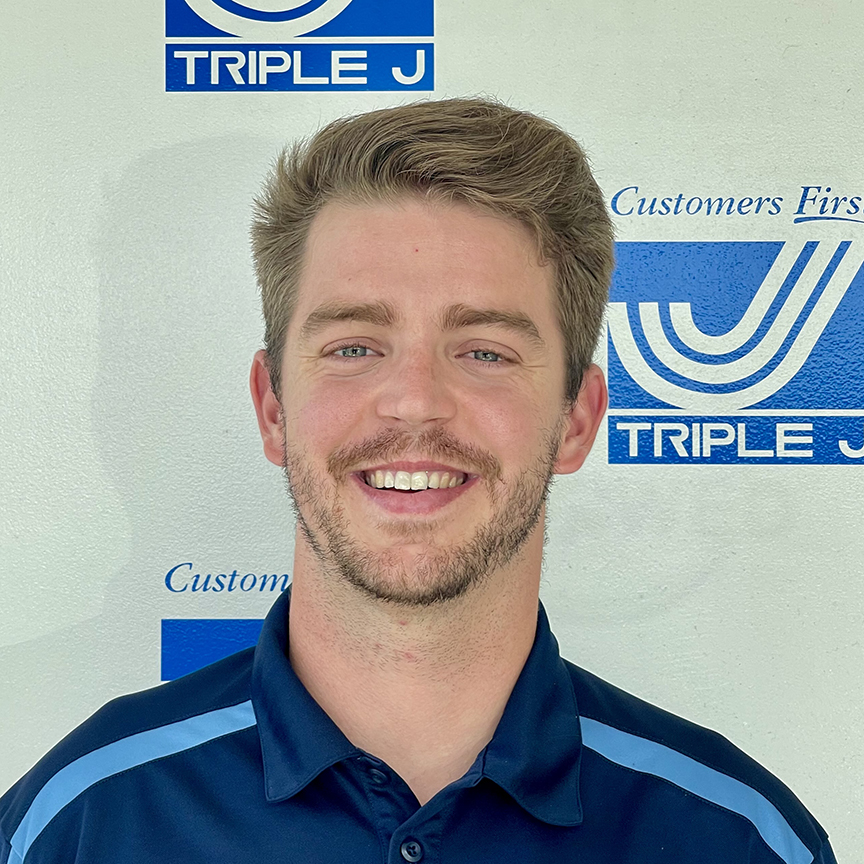
Jacob “Jake” J. Jones, 25, managerial apprentice, Triple J Enterprises Inc.
Jones holds a 2019 bachelor’s of business from Lees-McRae College in North Carolina.
I mainly went there because they have a cycling program [Jones is a Guam men’s cycling champion and an NCAA Division 1 cyclist]. I worked in the States for a couple of years at a Ford Lincoln dealer. I worked there … to learn a bit more in the service department and then I moved back here about a year ago, and I’ve been working with the family since [currently helping to oversee the parts and service department].
I started working with the family at a very young age — I was 14 or 15 — just washing cars. I did that up until high school. I ended up in the parts department, then sales and service. I’ve worked all through our dealerships at this point – the six operations, which is our service department and our parts department, in the auto division specifically.
There was always a choice if I wanted to go into the family business or not. It’s always been something I wanted to do. I would see myself in the auto industry even if it weren’t my family’s business. Between me and my cousin Jonah and my cousin Kai — we all have our sections – the same as our parents — that we’re interested in the most.
I’ve enjoyed working with the family. It’s taken some time to get used to it at a managerial level – working alongside my father [Jay B. Jones] and grandfather [Robert H. Jones] and uncles [Jeffrey B. Jones and R. Dan Murrell] – it’s a learning curve.
On other generations: Across the board, not just with my family — it’s sometimes harder to get across ideas that maybe aren’t inline with what they’ve always done — new ideas. … That’s the biggest challenge — seeing eye to eye and finding the middle ground on certain things like that. I’m fresh out of school, I worked at another dealership, so I have a lot of ideas. … A lot of the time they’re open to new ideas.
I’ve been learning from them since Day 1. There’s a deep history of success, so I can look up to them as role models. … I can look to them for advice.
One thing that my grandfather, uncles and dad were and are very good at is separating — to leave [work] at work or the right time to talk about certain things. But for one-on-one relationships, I’m not afraid to message my dad, or my uncles or my grandfather … it definitely makes it easier.
On his generation and work life balance: I think the biggest thing is different ideologies on employee hours … and a greater value on work-life balance. In a perfect world I’d get all my work done in four days. It’s not always a perfect world. If you look at my generation, that’s what we’re leaning towards — a shorter work week.
Role models: The biggest role models have been through athletics … cycling and when I was playing football in high school, mainly coaches over the years … and the service director at the Ford dealership I was working at in the states. I still reach out to him at times.
I’ve spent some time at the National Auto Dealership Association conferences … I’ve met peers through there that I’ve been able to work with. It’s been a good way to think outside the box.
On his generation: I think we get a bad rap. There are all these books on how to manage a Millennial, how to work with a Millennial. Some of the biggest differences are we are valuing our time more and doing things outside work. I love my work and it’s a passion but at the end of the day I’ve got other passions.
Big picture issues: Mainly for me recently it’s been Guam’s relying on fossil fuels and so forth. It’s pretty inevitable that vehicles are moving to electric vehicles. It’s going to put an additional strain on our power system. I think it’s coming a lot quicker than the people at [the Guam Power Authority] really know. We’ve delivered our first [electric vehicle] and we’ve got more on the way; we’ve installed our first charger and we’re working with Blink to install more chargers in more locations across the island. In the States and Europe — mainly Europe, it’s really shaping the electrical grid because people are powering their vehicles now off their home power.
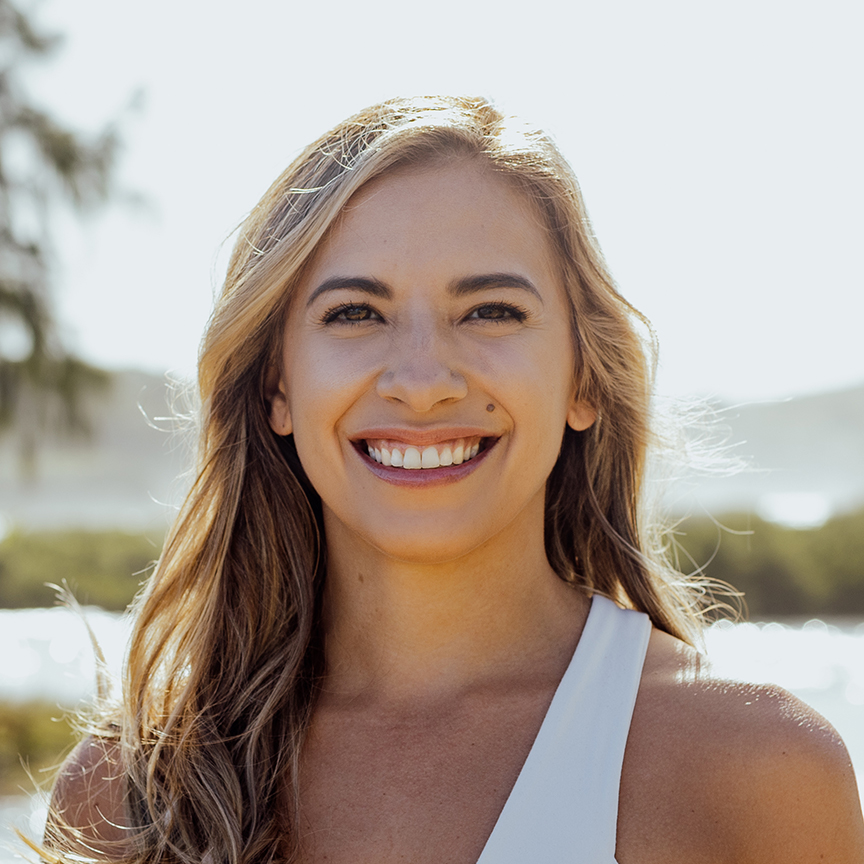
Livia A. Marati, 34, owner, Ina Wellness Collective
On her career: When I graduated from college [from the University of California, San Diego with a bachelor’s of arts in communication and a minor in dance], the tech scene was continuing its boom. In Chicago, Groupon was growing fast, and by the time I got to San Francisco, I knew I wanted to work for a company that had a stand-out culture and was expanding internationally. I really resonated with their mission of bringing the world together through live experiences. I wanted to be in the events world and around other creative, passionate people looking to disrupt the ticketing and event industries.
As I neared eight years at Eventbrite, I began to consider what was next. I was living abroad based in Amsterdam, traveling around the world launching offices, training new hires, supporting the integration of newly acquired companies and watching the business go through a big transition following an IPO. I had spent years in the events industry and talking to event organizers. I felt inspired to transition to the event creator space. I wanted to fuse my experience in events with my passion for health and wellness and create a business in a place that I felt deeply connected to. All signs pointed to Guam.
The idea for Ina Wellness Collective came about a year before I started it. This allowed me to make plans and start to lay the foundation for it without being [in Guam] yet. I started my certifications in Integrative Nutrition online and planned a month-long trip to Bali for my yoga teacher training on my way back home. It was also a choice me and my now-husband had to make. We knew balancing jobs alongside becoming entrepreneurs would be challenging, but we knew that it was getting us both closer to our vision for our life and lifestyle.
I could have never predicted launching my business centered around events, and a month later being in lock down. At that time, I had to choose to pivot quickly and continue moving forward knowing I now had a captive audience thinking about their health and wellness.
Working with different generations: As a company that aims to be inclusive and reach a wide audience, it’s incredibly valuable for me to include different perspectives, whether that’s from different generations, cultures, or people with different past experiences. There’s so much that different generations can teach me about motivation and behavior. In addition, as a health coach, I learn so much working with clients at different stages of their health and wellness journey.
Learning from older generations: From a wellness perspective, previous generations in Guam hold wisdom and knowledge of traditional ways of living off the land and healing. They are resilient, and have a deep-rooted sense of loyalty, respect and reverence.
What Marati’s generation does better: I think we are breaking the idea of the ‘hustle culture,’ and prioritizing flexibility, work/life balance and finding deep purpose in our work. In addition, mental health, burnout, and therapy are all things more actively talked about and for good reason. I think my generation has learned how to be agile and adapt quickly.
Work/life balance: I think we value work/life balance, having flexible schedules and coming into an office environment that is inspiring. As a foundation though, it’s important to feel adequately valued and compensated. Compensation is not just your salary, but also benefits, time off policies, and other valuable additions. Coming from working in tech in San Francisco with every employee benefit under the sun, I saw firsthand how people often stayed for the culture, people and mission of the company even when their day-to-day role was challenging. These days, I’ve been re-thinking the conventional work week — suggesting my team take mental health days, build in time off even during busy periods and switch up where they work in order to do their best work.
Role models: My grandfather, the late Joaquin C. Arriola, instilled the value of hard purposeful work and keeping the mind sharp. His legacy lives on within our family and community, and I think of him often in my entrepreneurial journey. My grandmother, the late Elizabeth P. Arriola, who lived a life of serving the community and honoring our culture, family and manamko.
I have been influenced by transformational live experiences that I’ve attended from festivals like Wanderlust and Burning Man to wellness retreats in destinations like Italy, Morocco and Guatemala. As an entrepreneur, I’ve hired coaches and business mentors with a focus on leadership, mindset and embodiment who support me grow my business in practical ways while staying connected to my bigger vision for Ina Wellness.
Big picture issues: One of driving inspirations behind creating Ina Wellness Collective is to be able to have an island that future generations can enjoy. I believe when we take care of ourselves, we can better take care of our families and community and have the energy to connect with, protect and take care of our island. I support our community efforts to focus on sustainability, growing our local small businesses and providing opportunities for our people and island to learn and thrive.
Serving the community: I’m currently a board member for the Guam Women’s Chamber of Commerce, chairing their Professional Development committee and most recently launched the mentor program.
I host on-going workshops and classes for community groups and nonprofits, and have worked with organizations like Guam Girl Scouts, Hunterspeaks and Guam Behavioral Health & Wellness Center. Ina Wellness Collective has a Wellness for All program which collects community donations, and sponsors wellness programs and classes for those who are unable to afford it at this time.
On her generation: Every generation has experienced a set of events, changes and challenges that influence how they think and act in the world. As a millennial, we were impacted by the recession and the rise of the internet and social media. In my opinion, this access to more information and more connection has created a generation filled with ideas and creativity with a hunger to make the world a better place.
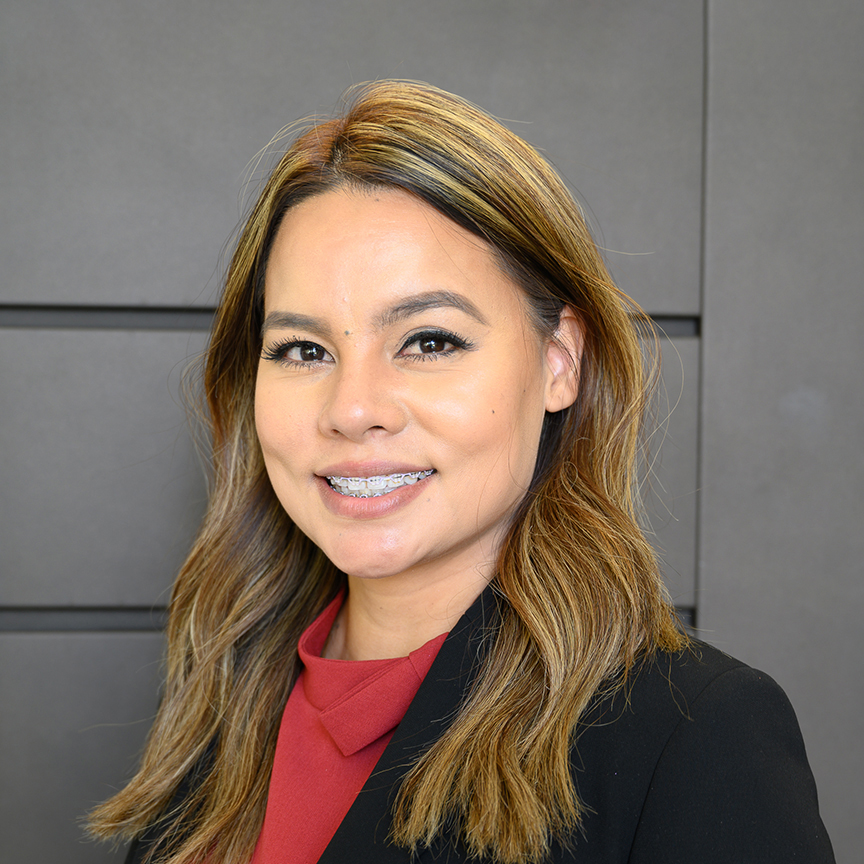
Nicole Lynn S. Patricio, 33, realtor, Re/Max Diamond Realty
Finding her career: I was in my second year of the nursing program at UOG and ... I was looking for something part-time. I had seen some realtors and I thought I’d give it a try — draw some income while attending nursing school. I had paused school to do the bootcamp ... It’s an in-depth training that requires your total commitment. My intention was to return to school… But everyone was so helpful, and I was learning so much, I ended up going full time and just really applying myself to the job.
Working with different generations: Younger generations bring a different perspective. They’re also good with social media, which is a big part of marketing now. And they bring that fresh perspective and offer new ideas to what we’re doing. Older generations, especially my brokers, Gina Campos and Liz Duenas, they bring a lot of wisdom and experience. And they’re really great at guiding us and sometimes even redirecting when we aren’t sure where to go. And then also, people from the generations above mine, they are usually more disciplined with a really good work ethic and time management skills.
Work-life balance: I do see it in my generation and with my coworkers in my office (that) it’s not just about the salary (but) I also feel like that’s true of us as an island. We’re a very tight-knit community … so I think it’s easier to say that’s true for all of us, making sure that it’s not just about money, but making sure that other portions of our lives, like our families and our community, are taken care of.
Role models: I would honestly say my two brokers, Gina Campos and Liz Duenas. They’re high achievers in all parts of their lives — they balance their lives, but also are really great at giving back to the community. And performing at such a high level… you’d think they would be busy, but they always are willing to help. They’re who I want to be when I grow up. A third person would be John Patricio, my children’s dad. He really motivated and would really help me and encourage me when I was struggling, he’s another one of those people who has a very good outlook on life.
Big picture issues: Five for all of them. I think it’s important that businesses are not only connected but engaged in their community, because they can make an impact. As a business, you have a relationship with the community, and it’s important that they use their influence to help make their community be a better place. Like supporting local, it’s important that we help our community businesses, because that impacts us, not just on a company level but as individuals.
Xyrus Eitaro Salii-Debold, 32, general manager, Penthouse Hotel, Koror
On his career: Salii-Debold served in the U.S. Air Force for seven years. He returned when his uncle who was running the hotel became ill.
“But even if my uncle hadn’t gotten sick, I would have returned. It was always my intent — or to start my own business. Getting out of the Air Froce was part of a calculated decision to come back and participate in the family business and business scene here.”
Other generations: The experience of working with older generations was a real benefit. A lot of business owners and members of the Palau Chamber of Commerce are older. I did gain knowledge from them, and I was able to apply some of that to make improvements at Penthouse. … Sometimes being surrounded by older people - it can be intimidating but it’s also nice (because) there’s a maturity level and a calmness that they bring with them to the table even when facing difficult situations.
Working with younger generations is energizing. I do like teaching and while I was in the Air Force, I would train younger people. It can be challenging because they’re young and still learning, but it’s also fun. They have young energy and it’s like a boost interacting with them.
On being mentored: Definitely while I was in the Air Force there was a lot of good mentorship. But more for Palau, when I first moved back, my Uncle [Lucas Salii Jr.] JR — we both moved back at the same time, but he had been more involved in the family business so he’s the one who really got me up to speed. I really appreciated his patience and guidance; I needed it because most of our customers are elderly, and they’re used to things being a certain way. So, when they have special requests or complaints, I go to him.
Role model: My aunt, Kate (Supreme Court Justice Kathleen M. Salii). She has such a busy job herself and even though she can be handling the biggest case in Palau, I still get messages about whether this was handled or what happened with that — it’s tough on me sometimes. She’s tough on me, but I appreciate it because I always learn from her.
Big picture issues: It’s a 5 for me — especially on the environmental issues and our responsibility. It’s who we are, our values here. Being back here in Palau and wanting to be in the ocean all the time (it’s important to do our part) I want our oceans to be clean. But from the business perspective, having a healthy environment will help us attract the right kinds of tourists, the ones who care about our tourism and our island. And we’re such a small place that it’s not like we need 100,000 tourists, so getting the right quality of visitors is just better for everyone all around.
His generation: I like to think we’re the bridge because we are further away removed from our educational years and have some years of work under our belt. We’re starting to see people who just got out of college or high school. We can help the generations older and younger than us communicate; help younger people understand why decisions are being made and why we can’t do certain things. Something might sound like a good idea but in the context here in Palau it contradicts our values or our way of life and doesn’t benefit our community. And then, again, helping the older generation with technology and opening them up, hopefully, to other perspectives is something else we can do.
And then eventually we’re both going to be in higher leadership positions (speaking of himself and girlfriend Chloe Chloe Ysikl Yano who is the Marketing and Programs Manager at Palau Visitors Bureau) and it’s going to be critical for us to learn and understand the good that came from the older generation and be able to explain it in a way that younger generations can understand and learn.
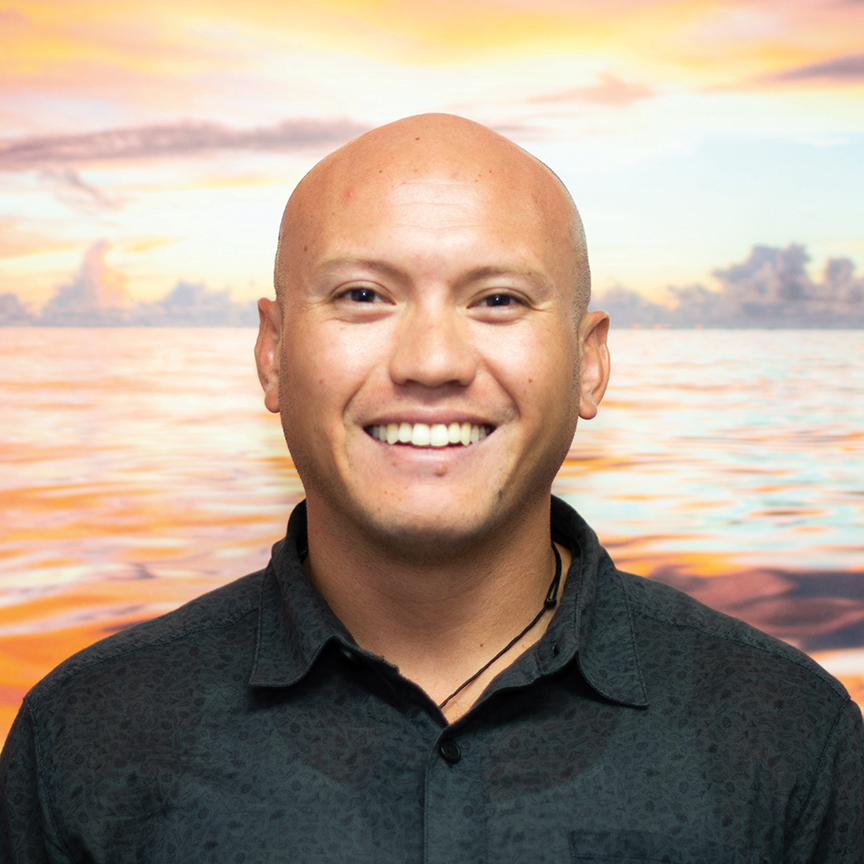
Jose T. Quan, 33, operations manager, Saipan Shipping Company Inc.
On his career: My love for the ocean initially led me down the path of pursuing an environmental emphasis in line with obtaining a bachelor’s degree in business management. My mentor at the time, Dr. Peter Houk, took me under his wing… he shared his knowledge and experience as I worked under him as his intern.
When the opportunity to work at Saipan Shipping Company was presented, I was intrigued by an industry completely out of my realm. I saw it as a way to challenge myself and gain new experiences under my belt.
I could have stayed within the government sector working as the Geographic Information Systems analyst. However, I deemed it was time for a change of pace in regard to my career.
Other generations: The opportunity to learn from those who have seen the shipping industry and maritime trade transform from the time vessels were loaded as breakbulk or loose cargo by hand up to today where vessels are loaded/unloaded using cranes.
I don’t necessarily think there are any setbacks or downfalls to working with a team consisting of other generations, because I think it is a matter of how you perceive these challenges and how you can use it to your advantage to find a solution to a problem. One’s experience is a resource and asset when you are working within the shipping industry.
What Quan’s generation does better: Adapt to technology where procedures are being modernized using databases connected via the internet.
Learning from older generations: The life lessons they have experienced within their time that they have lived through up to today. For example, the life lessons I have learned living through two super typhoons within the span of three years has taught me the value of perseverance and patience.
His generation: I think I serve as a bridge between the old and the new, being able to relate to the older generation and the younger generation simultaneously. I believe this to be a biproduct of how I was raised.
Work-life balance: I think I am a hybrid as I was born in 1989 but find myself relating closer to those who are my elders. I have embraced the mentality to do what is necessary to get the job done. Working within a family company this is more a part of my duties versus an expectation.
However, I am constantly working on improving a work-life balance and finding the time to get things done in a day, while having enough left for those who mean the most at the end of my day. I am aware it comes with the territory of taking on so many hats, but the key factor for me is to not make any excuses and just figure it out.
Role models: Darlene Cabrera, the general manager of Saipan Shipping Co., who has worked within the shipping industry for nearly 57 years. John Tenorio, the director of Saipan Shipping Co.Inc., is an accomplished businessman who has been a great role model in my serving capacity at Saipan Shipping as well as in my personal life. My mother, Priscilla Tenorio who is the president of Joeten’s Ace Hardware, has always taught me to work hard and persevere to reach my goals no matter what.
I have always been able to find counsel with her, especially when the juggling of hats at times may seem overwhelming. My sister, Somia Quan, the president of Joeten Motors Co. has always been my rock as I go through the motions as an aspiring individual within the business sector. My grandparents who have both passed on — Jose C. Tenorio (also known as “Joeten) and Soledad T. Tenorio (also known as “DaiDai”). Their values of family, duty to the family business, hard work, and education transcends generations.
Last but certainly not least, my fiancé Loriann Rabe. She has taught me the importance of positivity, kindness, humility and is my constant reminder of life’s true meaning and blessings.
On community service: I am serving as the treasurer within the Northern Marianas National Paddle Sports Federation; we focus on building the paddling culture within the CNMI as we participate within competitions in the Pacific to represent our delegation. Most recently, we had the Pacific Mini Games where the CNMI competed amongst the entire region of the pacific. I believe competitive sports is one the best avenues to show hard work, dedication, balance of lifestyle, and physical fitness.
I also serve as the vice president within the Marianas Outrigger Canoe club. We are a competitive paddling race team where we do our best to represent our island within the sport of Outrigger Canoe as we travel around Micronesia and the pacific to take the sport to greater heights within the CNMI.
We should all strive to obtain balance within the aspects of our life that we deem are important. We should continue to be intellectually challenged as that is how you maintain an edge over the competition. We should value our family and cherish every moment we can. The adoption of physical exercise is a must as health is now the renowned new wealth to our society.
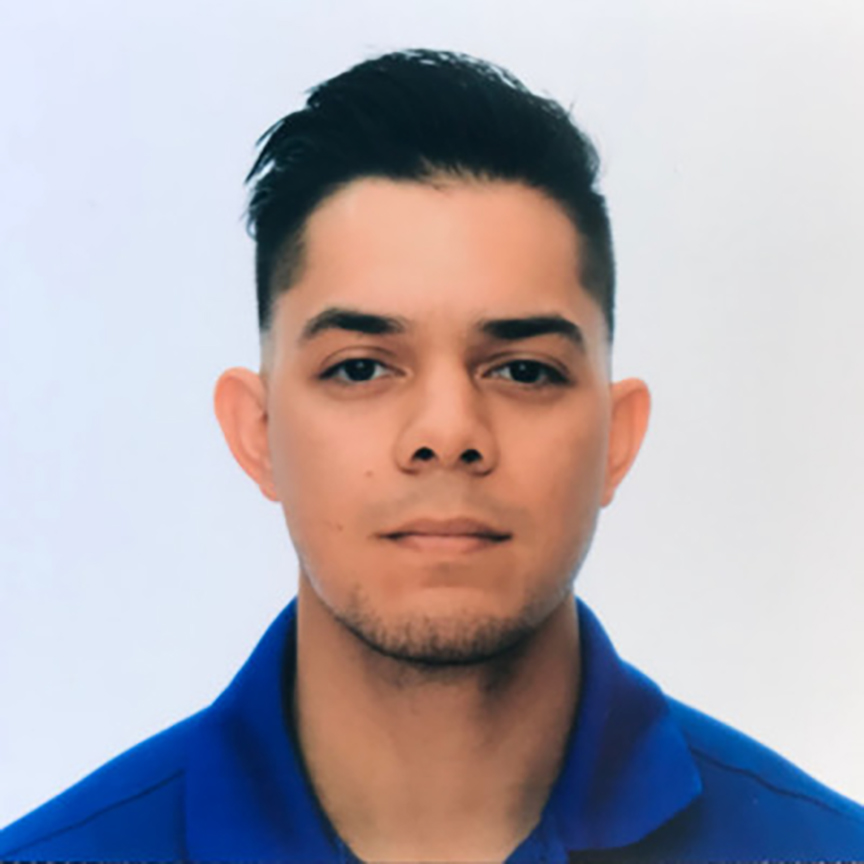
Jose E. Untalan, 29, vice president, CU Holdings Inc.
After achieving a 2014 bachelor’s of business administration from the University of Guam, Untalan considered banking as a career. “Originally that’s what I wanted to do, given my family history [His father is Edward G. Untalan, executive vice president and Guam-CNMI region manager of First Hawaiian Bank]. I wanted to start from the bottom [as a teller] and work my way up, just like my dad did. Every time I checked, my school schedule never allowed it.
[The associated real estate holdings of CU Holdings is PRI Inc., which began doing business as Paradise Estates in Dededo in 2004.] I came in when they were starting Paradise Meadows in Yigo. When I first joined the company, because my degree was in finance my uncle [Richard J. Untalan, president and CEO] had me work under our [chief financial officer] Deacon Steve Martinez. I started in November 2014.
I started handling the finance for the projects on a part-time basis to see if this field was something I was something I’d be interested in. Once I graduated, I became fulltime.
My uncle had me working solely on the Paradise Meadows project, so I could become familiar with the project and how a project runs – working contractors, working as an assistant project manager pushing the project, working with the government agencies … it was a crash course in project management, for sure. … We have one right now in Mangilao – Paradise Court.
I used to do work specifically for the Compadres Mall. In 2017 before my cousin Katrina [Untalan] joined I was the mall manager. … We also have real estate rentals at Paradise Estates and Paradise Meadows, so it was commercial property management and residential property management at the same time. I was doing both roles – assistant project manager and GM of the mall. It was a big learning curve for me.
[Now] my official title is vice president – finance/projects.
A career in a family business: It’s a definite blessing because I have access to great mentors, especially my uncle, who is extremely knowledgeable. There’s tough love; there’s a higher expectation of me, but it also serves as a driving factor.
Older generations: There’s definitely a significant difference in the ways we were raised. They were raised by what they call the Greatest Generation, the generation that survived World War II. They grew up with hardworking ethics, putting family first and those are great values that I think I’ve been able to pick up from them, particularly with … staying humble … that you don’t have to put yourself out there all the time and always wanting attention.
Untalan’s generation: My generation’s a lot more technologically proficient. In order to cut out a lot of time wasted; we are pretty savvy in trying find ways to cut it down to where we don’t spend too much time on one thing. In my work I’ve had to streamline a lot of things … teaching the older generation the importance of technology and the benefits of it is helpful.
Work-life balance: I play in a band and I’m also a DJ. It’s always about time management. My dad used to tell me if you want to stay up with the owls, you have to be ready to rise with the eagles. There were a couple of times early in my career where I maybe partied a little too hard. I think I’ve been able to develop a good balance between getting work done and being able to relax by playing music on the weekend.
On community service: I joined the [Guam Chamber of Commerce] Guam Young Professionals. I do want to start being more involved in the community. As I’ve gotten older I’ve grown to understand the importance of helping out in the community, because if you don’t go out and help, who’s going to do it? Growing up my family always emphasized the importance of helping others. … Especially in our Church setting, when there’s a need for help, I try to offer my services.
Role models: My grandfather Jose L. Untalan. I was born a year after his passing, which is why we share the same name. Throughout my career I’ve met a lot of older people who say they knew my grandfather and how great a man he was. It’s definitely a lot to live up to, since we share the last name. His values passed on to my uncle and my dad. Even though I never got to meet him, it’s like he’s still there, his values being passed down from generation to generation.


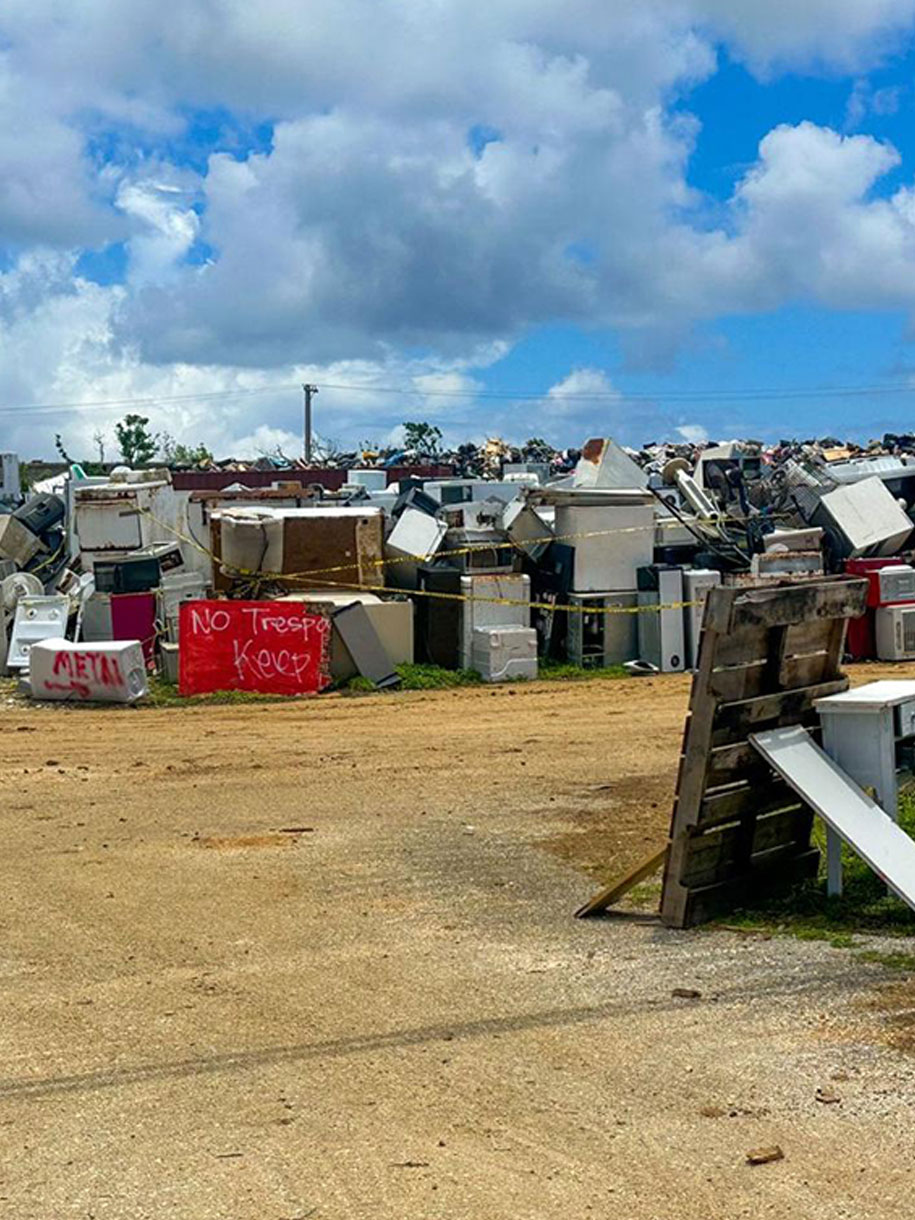
 facebook
facebook
 Whatsapp
Whatsapp
